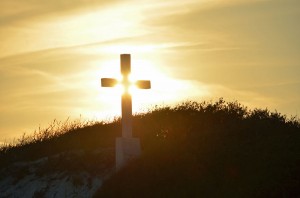Ideology and Idolatry
 A recurring theme of my writing and speaking these past few years has been the need for Catholics to overcome allegiances to political movements, parties, and ideologies. We are called to shape our culture, or at least be a prophetic voice that is unattached to purely temporal causes. My assumption, based on my own journey, has been that there are many people who are serious Catholics with a real relationship with Jesus Christ but who simply have difficulty detaching themselves from the constant pressure of our polarized and politicized media culture.
A recurring theme of my writing and speaking these past few years has been the need for Catholics to overcome allegiances to political movements, parties, and ideologies. We are called to shape our culture, or at least be a prophetic voice that is unattached to purely temporal causes. My assumption, based on my own journey, has been that there are many people who are serious Catholics with a real relationship with Jesus Christ but who simply have difficulty detaching themselves from the constant pressure of our polarized and politicized media culture.
I now believe that assumption is often wrong, and people like me are partly to blame. I have been reading Sherry Weddell’s Forming Intentional Disciples (truly, as Mark Shea says, the most important Catholic book of the decade) and contemplating with fresh eyes the hundreds of confrontations I’ve had online and in person with my fellow Catholics involving political disagreements. The problem is not too much politics. It is too little conversion and discipleship.
In describing the third “threshold of conversion,” Openness, Weddell tells the story of an atheist she calls Gareth. Gareth went through a time of great personal tragedy and reached out to a Catholic friend. However, he didn’t reach out as an intentional spiritual seeker. He simply had a new openness because he was thinking seriously about serious topics for the first time. The conversations usually involved intense disagreement, tough questions, and rash dismissals. But, he kept starting new conversations. That reminds me of a great many political conversations I’ve had with Catholics in the past three years.
I have come to realize, with great sadness, that I have often failed in these situations to be an effective witness for Jesus Christ. Even as someone who works in the public policy arena on behalf of the Church, my primary mission is to evangelize. When someone has a strained relationship with the Church, or has not yet experienced a life-changing encounter with the Lord, of what use is it for me to try to convince them that a just and compassionate immigration system would include this or that, that abortion and euthanasia are not negotiable, or that it is time to abandon the death penalty? Even if I win an argument, what is the risk I will lose a soul? And, if I win the soul, will the argument ultimately be necessary?
Last week, as though he were speaking directly to me (alas, he has not yet actually called or emailed me directly), Pope Francis addressed this very topic. Using the analogy of Church buildings that are routinely locked up (also a major pet peeve of mine), the Holy Father identifies ideology as a locked door that keeps people from entering the Church and encountering Jesus:
The faith passes, so to speak, through a distiller and becomes ideology. And ideology does not beckon [people]. In ideologies there is not Jesus: in his tenderness, his love, his meekness. And ideologies are rigid, always. Of every sign: rigid. And when a Christian becomes a disciple of the ideology, he has lost the faith: he is no longer a disciple of Jesus, he is a disciple of this attitude of thought… For this reason Jesus said to them: ‘You have taken away the key of knowledge.’ The knowledge of Jesus is transformed into an ideological and also moralistic knowledge, because these close the door with many requirements.
What does Francis believe is the cause of a Christian becoming “a disciple of the ideology?” “These do not pray, abandoning the faith and transforming it into moralistic, casuistic ideology, without Jesus.” In other words, Christianity becomes a set of principles or positions with which to judge others, not a living relationship with God.
The response to the Pope’s homily was extremely instructive. My favorite was from Michael Sean Winters. He correctly points out that the trick is recognizing our own ideologies; it’s really easy to spot ideology in other people. “Of course, no one ever thinks that they themselves are ideological. My ideology is a worldview. It is the other’s guy view of the world that is an ideology!” (For an almost-too-perfect-to-be-real example of this, click here.)
Winters’ point is exactly right, and his column is truly outstanding, but what I like most about it is that I know he and I come from completely different political backgrounds. I have spent almost my entire life in the “conservative movement” as a registered Republican. I am sure Winters would self-identify as a liberal or a progressive. I am sure he and I could have some intense debates about tax rates and health care policy, maybe even about the most effective way to increase legal protection for human life.
Yet as I read this column, particularly the last four paragraphs, I see a kindred spirit in the midst of a hostile world. Once you strip away the divisiveness of the politics of our particular country in this particular historical moment, we are brothers in Christ who can disagree on prudential matters but share without reservation our most cherished values. That’s because we have a friend in common, and His name is Jesus Christ.

